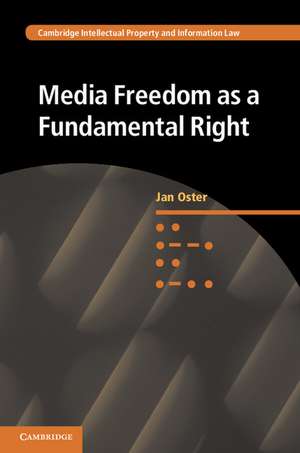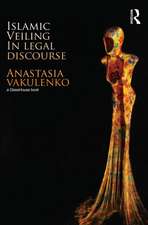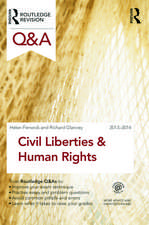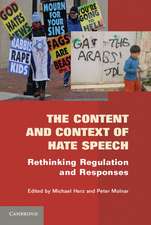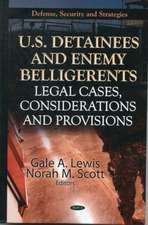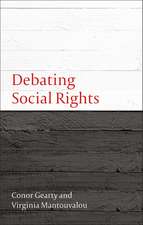Media Freedom as a Fundamental Right: Cambridge Intellectual Property and Information Law, cartea 30
Autor Jan Osteren Limba Engleză Hardback – 27 mai 2015
Din seria Cambridge Intellectual Property and Information Law
- 9%
 Preț: 695.67 lei
Preț: 695.67 lei -
 Preț: 285.16 lei
Preț: 285.16 lei - 9%
 Preț: 766.16 lei
Preț: 766.16 lei - 14%
 Preț: 726.42 lei
Preț: 726.42 lei -
 Preț: 185.40 lei
Preț: 185.40 lei - 14%
 Preț: 788.63 lei
Preț: 788.63 lei -
 Preț: 286.30 lei
Preț: 286.30 lei -
 Preț: 206.84 lei
Preț: 206.84 lei - 23%
 Preț: 853.98 lei
Preț: 853.98 lei -
 Preț: 335.34 lei
Preț: 335.34 lei -
 Preț: 445.69 lei
Preț: 445.69 lei - 14%
 Preț: 901.48 lei
Preț: 901.48 lei - 14%
 Preț: 784.48 lei
Preț: 784.48 lei - 14%
 Preț: 900.65 lei
Preț: 900.65 lei - 11%
 Preț: 500.96 lei
Preț: 500.96 lei -
 Preț: 320.55 lei
Preț: 320.55 lei - 11%
 Preț: 457.05 lei
Preț: 457.05 lei -
 Preț: 322.51 lei
Preț: 322.51 lei -
 Preț: 320.55 lei
Preț: 320.55 lei -
 Preț: 321.31 lei
Preț: 321.31 lei -
 Preț: 285.75 lei
Preț: 285.75 lei - 14%
 Preț: 728.05 lei
Preț: 728.05 lei - 14%
 Preț: 900.65 lei
Preț: 900.65 lei - 14%
 Preț: 895.68 lei
Preț: 895.68 lei - 14%
 Preț: 727.26 lei
Preț: 727.26 lei -
 Preț: 283.63 lei
Preț: 283.63 lei - 14%
 Preț: 729.73 lei
Preț: 729.73 lei - 14%
 Preț: 776.59 lei
Preț: 776.59 lei - 11%
 Preț: 520.41 lei
Preț: 520.41 lei -
 Preț: 396.20 lei
Preț: 396.20 lei - 14%
 Preț: 725.43 lei
Preț: 725.43 lei -
 Preț: 322.51 lei
Preț: 322.51 lei - 14%
 Preț: 1008.85 lei
Preț: 1008.85 lei -
 Preț: 470.76 lei
Preț: 470.76 lei -
 Preț: 288.04 lei
Preț: 288.04 lei
Preț: 755.35 lei
Preț vechi: 878.31 lei
-14% Nou
Puncte Express: 1133
Preț estimativ în valută:
144.58€ • 157.10$ • 121.53£
144.58€ • 157.10$ • 121.53£
Carte tipărită la comandă
Livrare economică 21 aprilie-05 mai
Preluare comenzi: 021 569.72.76
Specificații
ISBN-13: 9781107098954
ISBN-10: 1107098955
Pagini: 338
Dimensiuni: 152 x 229 x 21 mm
Greutate: 0.62 kg
Editura: Cambridge University Press
Colecția Cambridge University Press
Seria Cambridge Intellectual Property and Information Law
Locul publicării:New York, United States
ISBN-10: 1107098955
Pagini: 338
Dimensiuni: 152 x 229 x 21 mm
Greutate: 0.62 kg
Editura: Cambridge University Press
Colecția Cambridge University Press
Seria Cambridge Intellectual Property and Information Law
Locul publicării:New York, United States
Cuprins
Introduction: aim, scope and method of this study; Part I. The Theoretical Foundations of Media Freedom: 1. The rationales for freedom of expression; 2. Theory of media freedom; Part II. General Rules on Media Freedom: 3. Beneficiaries of media freedom: who is 'the media'?; 4. The content of media freedom: media speech privileges and institutional protection of the media; 5. The notion of an 'interference' with media freedom; 6. Justification of an interference with media freedom; Part III. Specific Limitations to Media Freedom: 7. Personality rights and intellectual property as 'rights of others'; 8. Threats to public order interests: national security, territorial integrity, public safety and prevention of disorder and crime; 9. The protection of health and morals; 10. Maintaining the authority and impartiality of the judiciary; 11. Incitement to hatred; 12. Religiously offensive publications; 13. Restrictions on commercial publications; 14. Media pluralism; Conclusion.
Notă biografică
Descriere
Jan Oster develops a coherent theoretical and doctrinal framework for the scope, content and limitations of media freedom.
